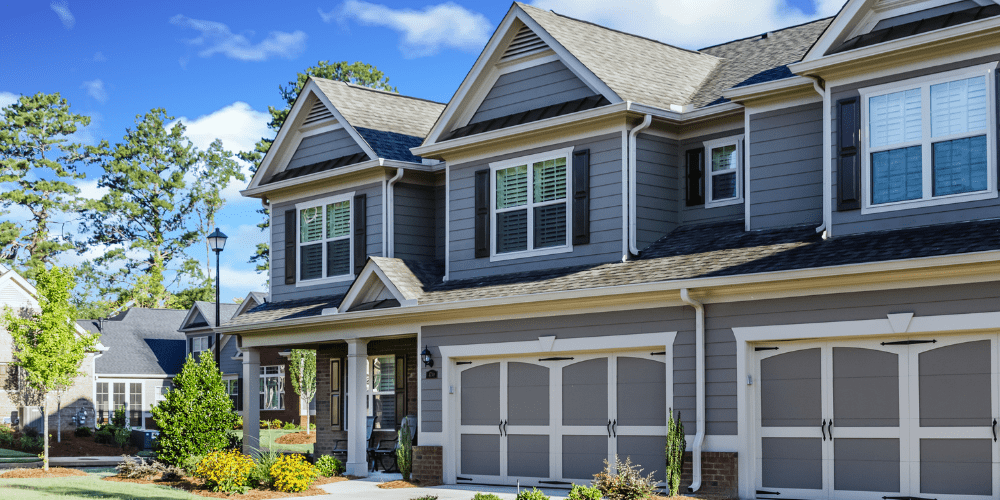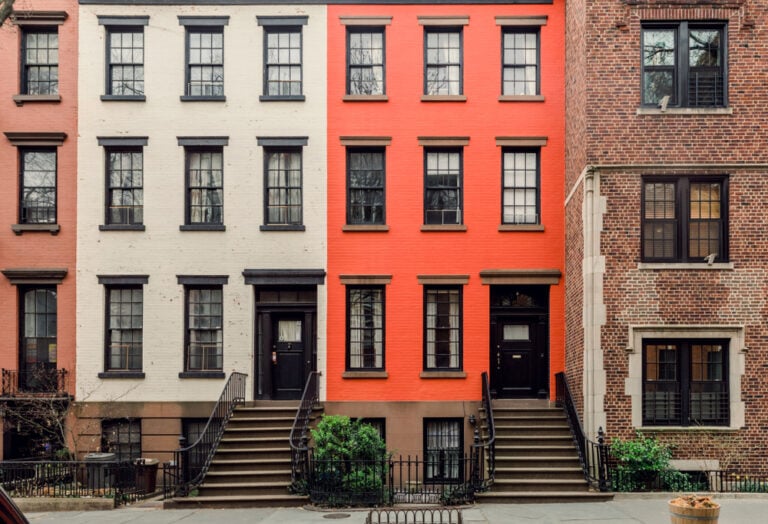Are Townhomes a Good Investment? | Renting Out a Townhome | Townhome as a Full-Time Residence | Townhome as a Vacation Home | Townhome Property Appreciation | Buying a Townhome
House prices have skyrocketed, leading buyers to seek alternative housing options aside from single-family homes, like townhomes. And for investors, townhomes can make desirable, low-maintenance rental properties.
According to data from the National Association of Realtors, the median price of a single-family home has increased from $269,100 to $397,600 in the past three years — an increase of 47%. NAR’s quarterly report on housing affordability stated that the family with a median income can afford the median home price, but only if almost a quarter of the family’s income goes to the mortgage payment.
Because the demand for townhomes is lower and lenders often have stricter financing requirements for them, they generally don’t increase in value like single-family homes. Because of this, townhomes may not yield as much return on investment, but they’re generally cheaper than single-family homes and you might face less competition for them.
Townhouses (also called townhouses) are the second-most common type of home purchased, according to the National Association of Realtors, and come in many shapes and sizes, but are townhomes a good investment? It depends on what you’re looking for. They can be perfect if you can’t afford a single-family home and want to own your home without the responsibility of maintaining a large lot.
There are a lot of nuances to understand when it comes to deciding whether or not to buy a townhome. For instance, what will the homeowners association (HOA) fees and rules be? Have the fees historically risen for the community you’re considering? How does appreciation work for a townhouse?
We’ll walk you through some of these issues, but we highly recommend getting a real estate agent on board sooner than later. A top local agent will be able to help you figure out the pros and cons of buying a townhouse in your area, and help you navigate the world of HOA regulations and fees.
Our friends at Clever Real Estate can match you with local real estate agents who have the expertise to guide you through investing in real estate. Choose from Clever’s nationwide network of trusted agents from brokerages like Coldwell Banker, Keller Williams, and RE/MAX.
Clever’s matching service is totally free with no obligation, and it can save you thousands when you buy, earning you cash back after you close – just for finding an agent with Clever. Get local agent matches sent directly to your inbox.
Are Townhomes a Good Investment?
|
Pros 👍 |
Cons 👎 |
|---|---|
|
|
Townhomes usually cost less than single-family homes with similar square footage, and many come with access to amenities like a playground, pool, clubhouse, or park. Owning a townhome means you also own the land underneath and around the home, as opposed to a condo, which only offers you ownership of the internal unit. Because townhomes are typically smaller with lower maintenance than single-family homes, they make great rentals.
However, townhouses tend to be smaller than traditional home types. You may not have a lot of space for storage and other living areas. Most townhomes are attached, meaning you may have to share a wall with noisy neighbors and lack privacy — something you wouldn’t have to worry about in a single-family home.
Most townhomes are governed by HOAs, which impose rules and fees that can quickly add up. HOA fees are $200 to $300 per monthon average but can range anywhere from $100 to $1,000 per month. But costs can vary quite a bit depending on the location, shared facilities, and services provided.
You might pay $85 per quarter if the HOA does virtually nothing other than maintain the park in the development. Or you could pay $3,000 or more for a luxury development that offers a concierge service, spa, gym, and valet parking in Los Angeles.
|
🏘️ What Is a Homeowners Association (HOA)? A homeowners association (HOA) is an organization that manages a neighborhood or community. It is responsible for the upkeep of common areas such as parks and pools, as well as enforcing any rules set by the members of the HOA. Homeowners in the community pay HOA fees to cover the costs of property maintenance and upkeep. |
» Read More: Condo vs. Townhouse: What’s the Difference and Which One Should You Buy?
Is Renting Out a Townhouse a Good Investment?
Renting out a townhouse can be a good investment, depending on the location, the rental market, and your financial situation. You’ll want to make sure you can still make a profit after covering a mortgage loan payment, as well as maintenance and other carrying costs.
First, check your HOA rules for the townhouse you own or are planning on buying. Many developments limit how many units can be rented. The HOA could also restrict short- or long-term rentals by requiring tenants to live there for a minimum amount of time.
You’ll also want to check out the local market. Are townhome rentals in demand? How much competition will you have if you rent out your property? What’s the going rate for rentals similar to yours?
Ultimately, townhouses can be a great option for a rental property. They generally cost less, and that lower cost can mean cash flow from renting them out.
» Read More: Should I Sell or Rent My House? Read This Before You Commit
Investing in a Townhome as a Full-Time Residence
Before you buy a townhome, consider where you want to live and which amenities you want in a full-time residence:
-
Do you have little kids? A playground might be on your must-have list.
-
Are you a fitness buff? Look for a townhome community with a gym or one near a park or walking trail.
-
Is outdoor space a must-have? Some townhomes have private yards, while some don’t.
Whatever you do, don’t overlook the HOA rules and restrictions. Review them carefully to make sure they won’t negatively impact your lifestyle and intended property use. For example, the HOA might restrict lawn and holiday decorations, enforce a noise ordinance, limit pet size and quantity, or not allow visible RVs or campers on your property.
You must also consider HOA fees and special assessments. While your dues generally cover regular services and maintenance, a special assessment is a one-time fee to cover the expense of a major repair or improvement. If you don’t pay the fees or assessments? The HOA could place a lien on your property or even foreclose on your townhome.
Investing in a Townhome as a Vacation Home
Owning a vacation home can help you diversify your income, build wealth, plan for retirement, and enjoy vacations with no additional lodging costs – which is probably why second-home sales are up 46% across the U.S.
Keep in mind that a second home serves a different purpose than an investment property. Your HOA or lender might also have rules against renting out the house if you buy it as a vacation home, so you’ll need to think about that before investing in a townhome as a vacation home
» Read More: Second Home vs. Investment Property: What’s the Best Financial Decision?
Investing in a townhome as your vacation home could be a good option. Townhouses are generally cheaper than single-family houses, lending to more affordable vacations. They’re also easier to maintain, thanks to the HOA picking up some common tasks. However, if you’re looking for something even more low maintenance, a condo might be a better option.
Do Townhomes Appreciate Like Other Properties?
Townhouses don’t appreciate like single-family homes. They tend to decrease in value faster and take longer to recover. Townhomes generally retain their value in the long term, but their worth has more volatility than single-family homes.
But many factors go into real estate appreciation — inflation, nearby job opportunities, development in the area, home improvements — so there isn’t a one-size-fits-all answer. We highly recommend talking to a local agent about the profitability of a townhome in your market.
Next Steps: Buying a Townhome
Buying a townhome is similar to buying any other type of real estate. First, connect with a mortgage lender to get pre-approved so you know your price range.
Then, hire a local real estate agent. An experienced agent can help you choose the right neighborhood, clarify any HOA jargon and negotiate on your behalf for the best deal possible.
Skip the Googling and asking around and go straight to the best agents in your area! Clever Real Estate’s nationwide network of real estate agents are pre-vetted and ready to help you purchase your new townhome. Matching with top agents through Clever is totally free, and buyers in buyers in 41 states and Washington D.C. can get up to cash back after closing!
🏡 Ready to buy a home?
If you're ready to buy your next home, our friends at Clever can help! Clever will match you with top-rated agents who know how to navigate your local market.
Best of all, buyers in 41 states and Washington D.C. can get 0.5% cash back after closing! That's $2,000 on a $400,000 home purchase, just for finding your agent through Clever.
Recommended Reading
FAQs About Buying a Townhome
What are townhomes?
Townhomes are multi-level houses that are typically built in a uniform community of other townhouses. These buildings usually share one or two walls with other townhouses and either have a small yard or no private yard. Townhomes are often regulated by a homeowners association that handles the amenities and maintenance. Read more about townhomes and whether they’re a good fit for you.
Do townhomes have good resale value?
Townhomes might not have as good a resale value as single-family homes because they appreciate more slowly. If you are looking for an investment property that has a better resale value, you’re better off with a single-family home, but a townhome can also be a great investment option. Learn more about whether or not townhomes are a good investment in the long run.
What are the disadvantages of a townhouse?
The disadvantages of a townhouse are that you may have less privacy, you might have to pay HOA fees and follow their rules and regulations, you might not have much of a yard, and your property will appreciate more slowly than a single-family home. Here’s what you need to know before you invest in a townhome.
Is it better to invest in a townhouse or a condo?
A townhouse is better to invest in if you want to be able to own the land the property is on and are willing to do a bit more maintenance. A condo is better to invest in if you want a low-maintenance property and are willing to sacrifice some privacy and land. Learn more about investing in a townhome.



